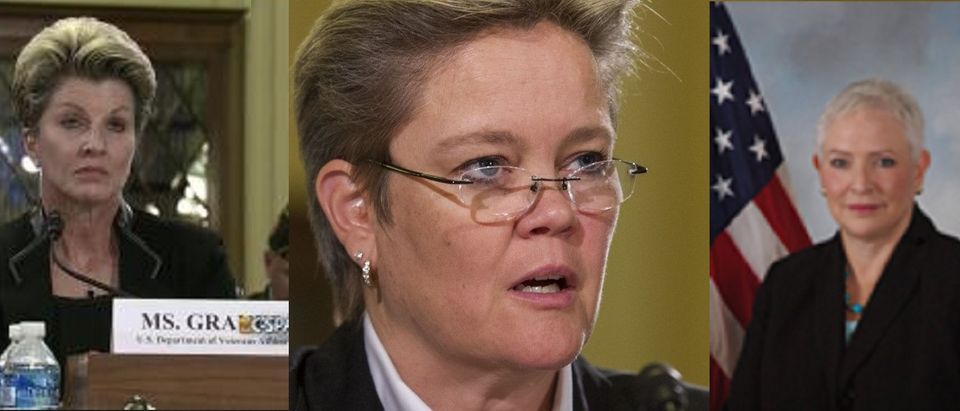Department of Veterans Affairs (VA) officials may have finally had enough of endless bureaucratic protections that block firings of top agency executives caught in gross misconduct and mismanagement.
In a dramatic about-face, the VA proposed to Congress Tuesday that the department be authorized to strip all senior executives and doctors of Merit Systems Protection Board (MSPB) appeal rights.
The agency-backed plan would convert VA senior executive service employees (SES) — the federal workforce’s top career bosses — to Title 38 employees, the classification of VA doctors. The plan would then authorize the firing of any Title 38 employee for cause, without appeal rights.
The Senate Veterans Affairs Committee and the House Veterans Affairs Committee have incorporated the VA proposal in discussions on a package of legislation now being considered.
VA officials had vehemently opposed similar ideas drafted by House Republicans, and as recently as early last week seemed to be good sports about having two of its most high-profile disciplinary actions blocked by MSPB last month. Deputy Secretary Sloan Gibson had criticized and tried to demote two hospital directors who created jobs for themselves, then billed taxpayers hundreds of thousands of dollars in relocation costs. But after the MSPB forced him to keep them in place, he said they weren’t so bad after all.
The straw that broke the camel’s back may have been MSPB’s overturning of a third negligent hospital director’s firing last week in Albany, N.Y.
“My judgment is owed considerable deference by the MSPB,” Gibson said in a statement following that decision. “Yet based on this and other recent decisions, it appears the MSPB does not agree with the Congress’ or the VA’s interpretation of the extent of my authority and has, once again, substituted its judgment for mine and demonstrated a willingness to second guess the VA’s application of legitimate high standards for accountability.”
Gibson stated that if MSPB would not permit the negligent director’s firing, he would make certain she is reassigned to duties that don’t require contact with patients. She would continue to be paid her full salary.
“In my judgment, a medical center director who fails to proactively address patient safety concerns or fails to be an advocate for vulnerable veteran patients has no place in the VA,” Gibson said.
VA spokesman James Hutton told The Daily Caller News Foundation that “Title 38 recognizes the medical profession in a different way. There is greater flexibility in pay, location premiums, disciplinary processes and other elements. This is a new concept that has come out of discussions with the committee. Nothing formal has been submitted or finalized.”
The VA’s sudden support for a modified version of a move it previously opposed may be because the change could also serve as a backdoor way to boost the salaries of hospital administrators. SES members can make up to $180,000 a year, and doctors can make even more.
Neither Sen. [crscore]Richard Blumenthal[/crscore] of Connecticut, nor Rep. [crscore]Corrine Brown[/crscore] of Florida responded to TheDCNF’s request for comment on the VA proposal. Blumenthal is the ranking Democrat on the Senate Veterans Affairs Committee, while Brown is the top Democrat on the House counterpart.
Blumenthal has relied on the VA’s unionized workforce for political support by ensuring the myriad of job protections for rank and file government employee union members aren’t diminished in any way. “He stood up for us when we needed him. Now it’s time to return the favor,” the American Federation of Government Employees wrote in an October political missive.
But SES-ers are management-level employees, not labor.
In 2014, Congress passed the Veterans, Access, Choice and Accountability Act, which was intended to enable VA to fire bad senior managers. But first, Sen. Bernie Sanders went to bat for the SES — the elite, powerful one percent of the federal workforce — to ensure managers could contest their firings, neutering the act.
Veterans have died needlessly in hospitals run by directors who the department wanted to remove for incompetence or wrongdoing, but couldn’t.
In the two high-profile cases overturned by MSPB last month, the board barred removing corrupt senior executives Kim Graves and Diana Rubens from the SES, citing the VA had rarely disciplined other managers as its justification.
When moving to punish her, Gibson told Rubens that he had “lost confidence in your ability to function effectively as a senior executive.” Yet after demoting her was blocked by the MSPB, he changed his tenor.
“I have always had a high regard for Diana Rubens as a manager and a leader… What has happened here is we’ve taken two good people, they made an error in judgement, and the judges have upheld that. These are good people,” Gibson told reporters during a Feb. 2 conference call.
Yet at the same time, he hinted at a growing dissatisfaction with the MSPB process that found wrongdoing, but barred disciplinary action. “We have charges that have been sustained, yet no punishment, which I do not believe reflects the intent of Congress,” Gibson said.
In the most recent Albany case, VA hospital director Linda Weiss failed to move against rampant abuse of veterans, including a nurse stealing painkillers from veterans and injecting them with saltwater instead. Gibson still insists she should be fired.
The MSPB also blocked the firing of Sharon Helman, director of the Phoenix hospital, based on her critical role in VA’s deadly wait-time scandal — but ultimately did allow the action as a result of unrelated corruption involving trips to Disney World paid for by a government contractor.
Helman has since appealed that MSPB ruling using yet another layer of appeals rights.
All content created by the Daily Caller News Foundation, an independent and nonpartisan newswire service, is available without charge to any legitimate news publisher that can provide a large audience. All republished articles must include our logo, our reporter’s byline and their DCNF affiliation. For any questions about our guidelines or partnering with us, please contact licensing@dailycallernewsfoundation.org.












